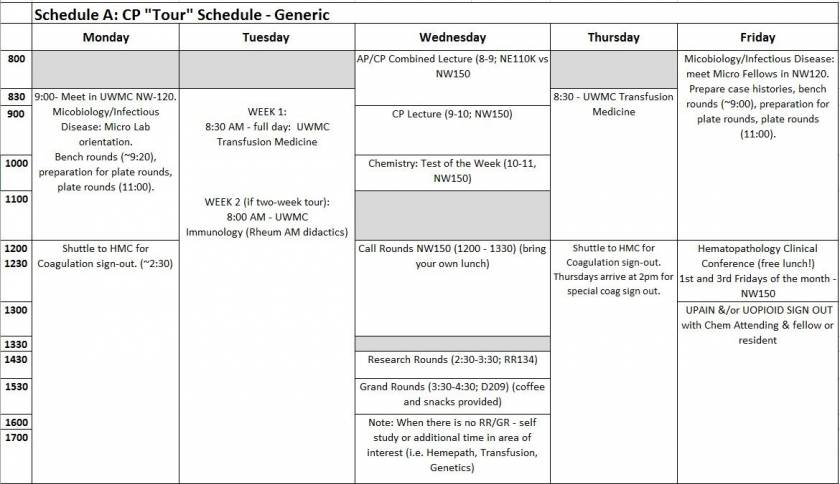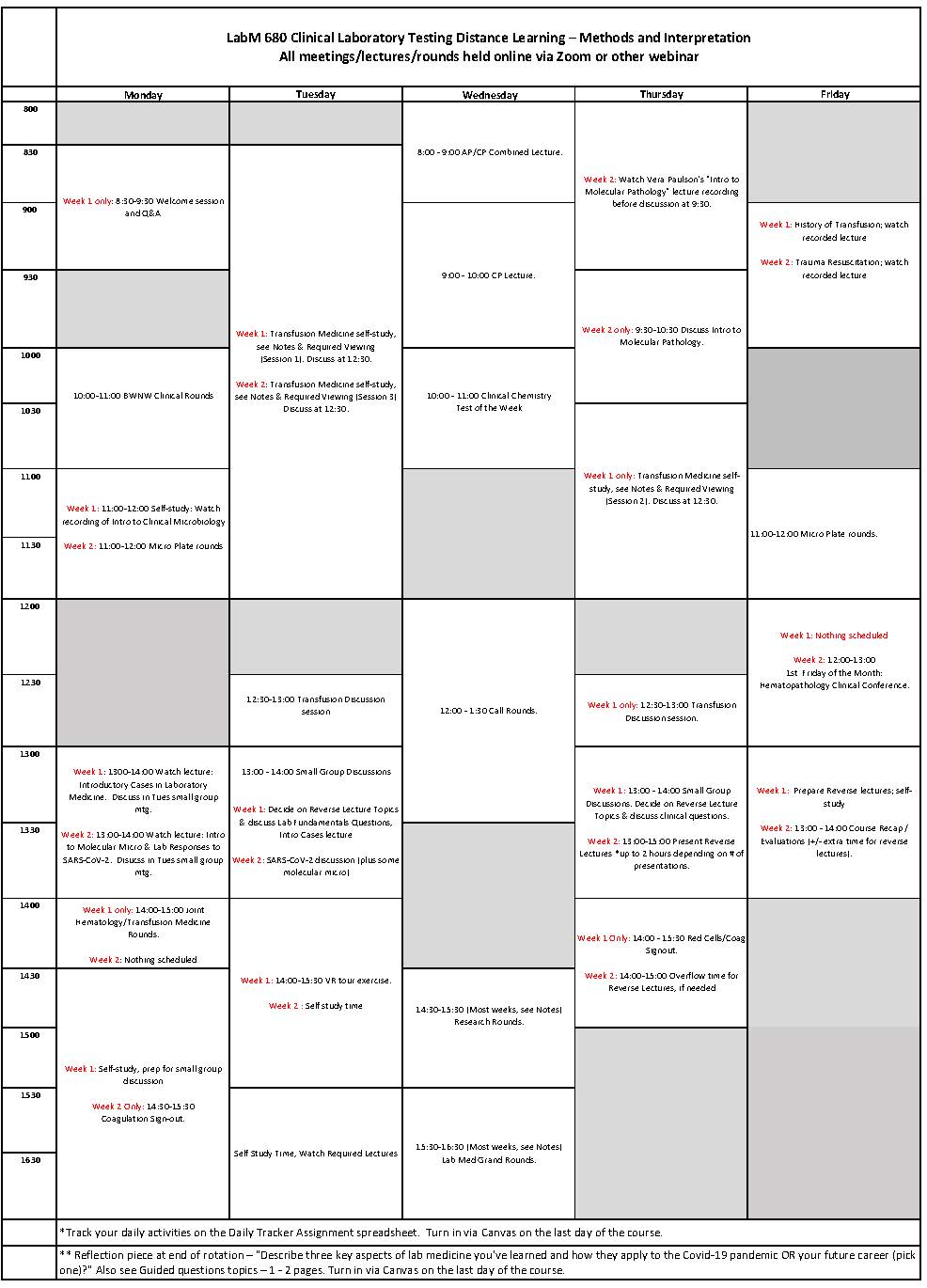LAB M 680
IMPORTANT NOTICE: LAB M 680 is being offered as a modified, distance-learning course until further notice. Please contact Tho Bui lmclerk@uw.edu with questions.
Overview
Faculty in the Department of Laboratory Medicine are responsible for all clinical laboratory analyses at the principal teaching hospitals: University of Washington Medical Center, Harborview Medical Center, Seattle Children's Hospital and Regional Medical Center, Seattle Cancer Care Alliance and the Veterans Administration Puget Sound Health Care System.
This web page is designed to familiarize the medical student with the courses available in Laboratory Medicine. Course descriptions outline what each clerkship rotation covers. Prerequisites are listed, where applicable.
Whether you decide to register for one of our courses or not, we encourage you to seek out our staff, faculty, fellows, and residents for consultation regarding blood smears, Gram stains, or other interesting laboratory data. Our laboratories are staffed 24 hours a day and our resident-on-call (206.598.6190) is available to help you with urgent problems relating to laboratory care for your patient.
Registration Information
Pre-registration is handled through the Office of Academic Affairs, according to the policies of the School of Medicine and the clerkship calendar.
Please contact the Clerkship Administrator, Tho Bui, at lmclerk@uw.edu or 206.598.1566 for questions about this process.
Student health related information
The UWSOM supports students’ access to healthcare and strongly encourages them to obtain and maintain health insurance while enrolled at the UWSOM. The consolidated content on the links below has been created by collaboration between students and the UWSOM student affairs to ease of referencing for student related health information. All three sources will be updated centrally by student affairs and the Student Committee on Healthcare Access (SCoHA). If you have questions regarding the content, please reach out to adminsa@uw.edu.
Healthcare Access for Medical Students
SOM-Telehealth Program for Medical Students
LAB M 680 - Clinical Laboratory Testing Distance Learning - Methods and Interpretation
Course Directors: Rebecca Treger, MD, PhD and Maryam Asif, MD, MBBS
LAB M 680 Distance Learning course is being offered in place of the LAB M 680 in-person elective until further notice.
Please note: We require a minimum of four medical students to register for each offering of the distance learning course. Please contact lmclerk@uw.edu to inquire about the status of the time frame you are interested in, and for permission to register.
Visiting medical students are welcome to apply in VSLO.
Course Description
This clerkship provides medical students an opportunity to develop their diagnostic and patient management skills through directed distance learning in the hospital-based clinical laboratory. During the COVID-19 pandemic, the clinical laboratory response has been dynamic. Laboratory Medicine resident service work, conferences, and didactics have shifted to a predominately remote-access paradigm. This represents a unique opportunity to participate in similar, clinical activities with some additional guidance. The student will directly observe faculty-level review of test results ("sign-out") or rounds and complete both guided and independent study; this may involve small group sessions, journal article reading, live and/or recorded didactics. Students will reflect on and share their experiences. The goal of the schedule is to give students a glimpse of multiple laboratories and the breadth of testing performed in the Department. Special focus may include how the clinical laboratories have mobilized in response to an urgent pandemic threat, and whether this response is generalizable or unique to UW Laboratories.
The primary aims of the general rotation are to:
- Introduce students to common activities of the laboratory, including issues that frequently require Laboratorian consultation;
- Introduce and explore concepts of pre-clinical variables, including labeling/patient identification and patient safety in the clinical lab; and
- Encourage consultation with Laboratorian/Pathologist colleagues in future clinical practice.
Prerequisites: NONE.
Sample Schedule (subject to change)
Everything below this line is in reference to the LAB M 680 in-person elective.
LAB M 680P - Clinical Laboratory Testing - Methods and Interpretation (in-person elective, not offered currently)
Course Directors: Rebecca Treger, MD, PhD and Maryam Asif, MD, MBBS
LAB M 680 provides medical students an opportunity to develop their diagnostic and patient management skills through the use of the clinical laboratory.
Students will experience a variety of laboratory areas. The two‑week, full‑time modules approach the clinical laboratory from a variety of emphases. Recommended reading material will be introduced by the individual instructors.
This course is designed for third- and fourth-year medical students who have completed twelve weeks of clinical clerkships. Confirmation of assignment and instructions will be sent to the student via the email addresses in the Medical Student Directory prior to the starting date. Final assignment will be made on the basis of student choices and subsection availability.
The goal of the LAB M 680 course is to give students a glimpse of multiple laboratories and the breadth of testing performed in the Laboratory Medicine Department, and to provide maximum exposure to faculty, fellows, and residents.
The primary aims of the rotation are to:
- Introduce students to common activities of the laboratory, including issues that frequently require Laboratorian consultation;
- Explore concepts of pre-clinical variables, including labeling/patient identification and patient safety in the clinical lab; and
- Encourage consultation with Laboratorian/Pathologist colleagues in future clinical practice.
Prerequisites: Completion of Internal Medicine and Surgery clinical clerkships
Three options are offered for program content during this clinical rotation:
- A two-week general 'Tour of Laboratory Medicine' (default; recommended for most students)
- A one week general 'Tour' followed by a week of specialization (subspecialty rotation is not always available)
- Two weeks of specialized instruction with a specific laboratory (subspecialty rotation is not always available)
Sample Schedule, General 'Tour' Option

NOTE: All of the following listings are subsections of LAB M 680 and may be available for subspeciality rotations.
Genetic Testing, Adult
Dr. Konnick, Dr. Lockwood, Dr. Pritchard, and Dr. Paulson - University of Washington Medical Center
Provides basic exposure to common molecular tests performed for adults to diagnose genetic disease and predict response to targeted cancer therapies.
Hematopathology
Dr. Cherian and Dr. Edlefsen - University of Washington Medical Center and Seattle Cancer Care Alliance
Students learn the basic morphology of blood, bone marrow, and lymph nodes, as well as methods of cell counting and the indications for hematology test selection. Case studies are provided for integration of blood cell morphology and clinical behavior. The use of cytochemical stains, flow cytometry, and molecular techniques in diagnosing leukemia and lymphoma are emphasized, as are techniques used to diagnose red blood cell disorders.
Immunology
Dr. Wener, Dr. Fink and Dr. Morishima - University of Washington Medical Center
Designed to familiarize the student with the role of diagnostic clinical immunology in clinical medicine. Emphasis will be placed on the use of immunologic laboratory data in the diagnosis and management of autoimmune and immunologically mediated diseases. Methods for recognition and identification of abnormal serum proteins and autoantibodies will be introduced.
Informatics
Dr. Hoffman, and Dr. Mathias - University of Washington Medical Center
Introduces the student to the use of the computer in medicine, healthcare, and medical education. Students have the opportunity to write programs with authoring software and programming languages and/or explore the use of the Internet, the use of information systems in health care and the clinical laboratory, and issues associated with computerizing the medical record.
Microbiology
Dr. Lieberman, Dr. Bourassa, and Dr. Murphy - University of Washington Medical Center
Medical students work in close collaboration with Clinical Microbiology faculty and fellows to understand the services provided by the clinical microbiology laboratory for the management of patients. Key learning points include recognition of significant culture results, contaminating microbiota from true pathogens, high-yield antibiotic resistance profiles, and molecular microbiology testing strategies. Cultures and stains will be demonstrated and discussed several times weekly with the laboratory staff (bench rounds) and infectious diseases clinical teams (plate rounds). Depending upon current cases and student interest, trainees may be able to participate in infectious diseases pathology consultations and/or have a deeper exploration of molecular microbiology testing. This subsection is a key component of the "general tour" schedule.
Hematology
Dr. Sabath - University of Washington Medical Center and Harborview Medical Center
Emphasis on discussion and microscopic identification of hematological cells in normal and disease states using case studies. Includes introduction to coagulopathies and appropriate testing strategies. Additional experience in the performance of tests appropriate to the small laboratory.
Molecular Virology
Dr. Greninger, Dr. Jerome, Dr. Coombs - Molecular Virology Lab, 1616 Eastlake Avenue East
This course introduces the student to the development and use of molecular tests to detect a wide spectrum of human viral pathogens. The rationale for molecular testing and the interpretation of test results will be reviewed for different viruses. Role of molecular tests in monitoring of antiviral drug therapy, and in assessing resistance to antiviral drugs will be reviewed via tutorials with senior staff and faculty. Emphasis will be placed on the role of these methods in care of HIV patients and in monitoring patients with chronic viral hepatitis. Quality control and quality assessment programs will be described. In this fast paced area, development of new approaches and better tests is ongoing. The student will be introduced to evolving, as well as current, methodology by the research scientists in the lab. This rotation is not always available and request is subject to Course Directors' approval.
Transfusion Medicine
Dr. Hess, Dr. Pagano, and Dr. Gernsheimer - University of Washington Medical Center
The transfusion medicine rotation is designed to introduce medical students to the laboratory and clinical basics of a hospital-based transfusion service. Students will learn the meaning of and the indications for key tests (e.g. type and screen, crossmatch, antibody identification), indications for blood component (RBC, platelet, plasma, cryoprecipitate) therapy, adverse events related to transfusion, and much more. A typical day involves going over new cases at morning rounds and afternoon didactic and case-based teaching sessions. This subsection is a key component of the "general tour" schedule.
University of Washington School of Medicine Resources
Clinical Grade Review, Challenge, and Appeal Process website
